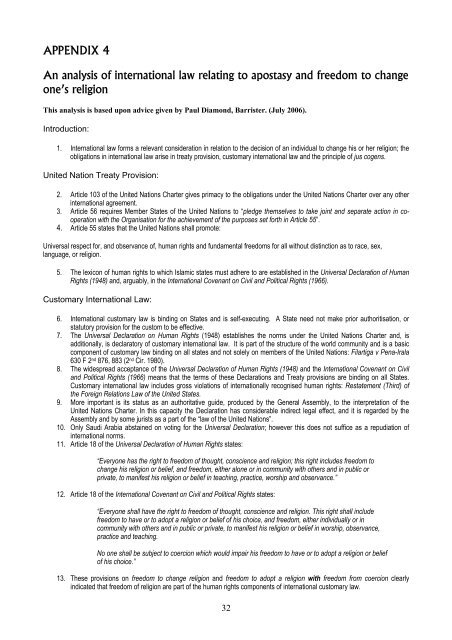Apostasy : An Overview - The Maranatha Community
Apostasy : An Overview - The Maranatha Community
Apostasy : An Overview - The Maranatha Community
You also want an ePaper? Increase the reach of your titles
YUMPU automatically turns print PDFs into web optimized ePapers that Google loves.
APPENDIX 4<br />
<strong>An</strong> analysis of international law relating to apostasy and freedom to change<br />
one’s religion<br />
This analysis is based upon advice given by Paul Diamond, Barrister. (July 2006).<br />
Introduction:<br />
1. International law forms a relevant consideration in relation to the decision of an individual to change his or her religion; the<br />
obligations in international law arise in treaty provision, customary international law and the principle of jus cogens.<br />
United Nation Treaty Provision:<br />
2. Article 103 of the United Nations Charter gives primacy to the obligations under the United Nations Charter over any other<br />
international agreement.<br />
3. Article 56 requires Member States of the United Nations to “pledge themselves to take joint and separate action in cooperation<br />
with the Organisation for the achievement of the purposes set forth in Article 55”.<br />
4. Article 55 states that the United Nations shall promote:<br />
Universal respect for, and observance of, human rights and fundamental freedoms for all without distinction as to race, sex,<br />
language, or religion.<br />
5. <strong>The</strong> lexicon of human rights to which Islamic states must adhere to are established in the Universal Declaration of Human<br />
Rights (1948) and, arguably, in the International Covenant on Civil and Political Rights (1966).<br />
Customary International Law:<br />
6. International customary law is binding on States and is self-executing. A State need not make prior authoritisation, or<br />
statutory provision for the custom to be effective.<br />
7. <strong>The</strong> Universal Declaration on Human Rights (1948) establishes the norms under the United Nations Charter and, is<br />
additionally, is declaratory of customary international law. It is part of the structure of the world community and is a basic<br />
component of customary law binding on all states and not solely on members of the United Nations: Filartiga v Pena-Irala<br />
630 F 2 nd 876, 883 (2 nd Cir. 1980).<br />
8. <strong>The</strong> widespread acceptance of the Universal Declaration of Human Rights (1948) and the International Covenant on Civil<br />
and Political Rights (1966) means that the terms of these Declarations and Treaty provisions are binding on all States.<br />
Customary international law includes gross violations of internationally recognised human rights: Restatement (Third) of<br />
the Foreign Relations Law of the United States.<br />
9. More important is its status as an authoritative guide, produced by the General Assembly, to the interpretation of the<br />
United Nations Charter. In this capacity the Declaration has considerable indirect legal effect, and it is regarded by the<br />
Assembly and by some jurists as a part of the “law of the United Nations”.<br />
10. Only Saudi Arabia abstained on voting for the Universal Declaration; however this does not suffice as a repudiation of<br />
international norms.<br />
11. Article 18 of the Universal Declaration of Human Rights states:<br />
“Everyone has the right to freedom of thought, conscience and religion; this right includes freedom to<br />
change his religion or belief, and freedom, either alone or in community with others and in public or<br />
private, to manifest his religion or belief in teaching, practice, worship and observance.”<br />
12. Article 18 of the International Covenant on Civil and Political Rights states:<br />
“Everyone shall have the right to freedom of thought, conscience and religion. This right shall include<br />
freedom to have or to adopt a religion or belief of his choice, and freedom, either individually or in<br />
community with others and in public or private, to manifest his religion or belief in worship, observance,<br />
practice and teaching.<br />
No one shall be subject to coercion which would impair his freedom to have or to adopt a religion or belief<br />
of his choice.”<br />
13. <strong>The</strong>se provisions on freedom to change religion and freedom to adopt a religion with freedom from coercion clearly<br />
indicated that freedom of religion are part of the human rights components of international customary law.<br />
32








